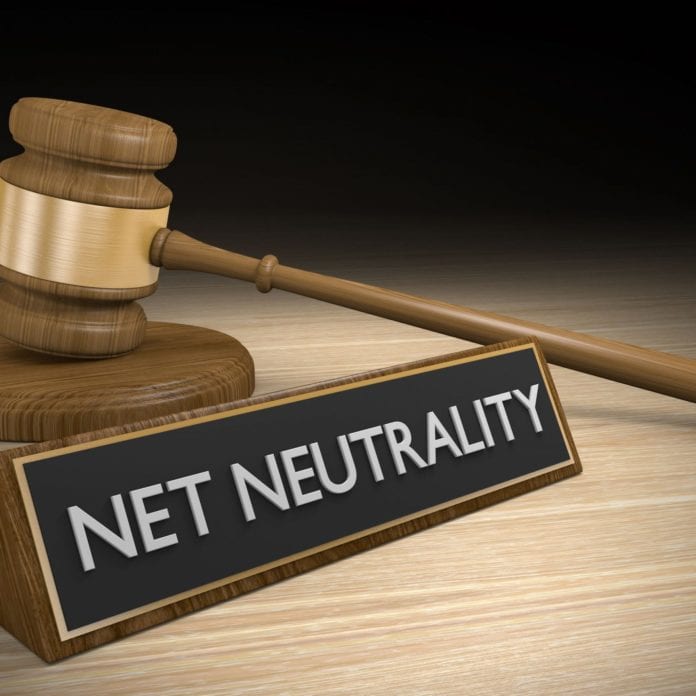Court cites FCC Chairman’s new rulemaking process in denying review
A federal appeals court has declined to review its decision upholding open internet rules, citing the fact that the Federal Communications Commission has announced plans to repeal the rules.
The District of Columbia Circuit Court of Appeals noted that it had previously ruled to uphold so-called net neutrality rules that were issued by the FCC, through the ruling of a partial panel of the court. U.S. Telecom, which had sued over the net neutrality regulations, asked the full court to review the decision, a process called en banc review.
“En banc review would be particularly unwarranted at this point in light of the uncertainty surrounding the fate of the FCC’s order,” the court concluded in its opinion. “The agency will soon consider adopting a Notice of Proposed Rulemaking that would replace the existing rule with a markedly different one. … In that light, the en banc court could find itself examining, and pronouncing on, the validity of a rule that the agency had already slated for replacement.”
The FCC is in the midst of preparing a notice of proposed rulemaking that will explain how it wants to eliminate net neutrality laws. FCC Chairman Ajit Pai said the NPRM will seek comment on how the FCC should roll back the existing law. The agency proposes to return the classification of broadband service from a Title II telecommunications service to a Title I information service. In addition, the FCC wants to eliminate the so-called Internet conduct standard — the standard the FCC used to warrant its investigation of T-Mobile’s Binge On and other services that offer consumers free data. Those investigations are on hold. Thirdly, the FCC is seeking comment on how it should approach the so-called “bright line” rules, which ban blocking of content, throttling, and paid prioritization.
Circuit Court Judge Srikanth Srinivasan, joined in the opinion by Judge David Tatel, wrote that “The wisdom of the net neutrality rule was, and remains, a hotly debated matter. The FCC received the views of some four million commenters before adopting the rule … and the debate over the rule continues to this day, with the agency now poised to consider replacing it. We have no involvement in that ongoing debate. Our task is not to assess the advisability of the rule as a matter of policy. It is instead to assess the permissibility of the rule as a matter of law. Does the rule lie within the agency’s statutory authority? And is it consistent with the First Amendment? The answer to both questions, in our view, is yes.”
Pai issued a statement on the federal circuit court ruling that said: “In light of the fact that the Commission on May 18 will begin the process of repealing the FCC’s Title II regulations, it is not surprising, as Judges Srinivasan and Tatel pointed out, that the D.C. Circuit would decide not to grant the petitions for rehearing en banc. Their opinion is important going forward, however, because it makes clear that the FCC has the authority to classify broadband Internet access service as an information service, as I have proposed to do. I also agree with many of the points made by Judges Brown and Kavanaugh in their compelling opinions explaining why the Commission’s Title II Order was unlawful.”
Circuit court judges Janice Rogers and Brett Kavanaugh dissented, with Kavanaugh declaring that “the net neutrality rule is unlawful and must be vacated,” due to both lack of clear authority from Congress for the FCC to make sure a ruling and violation of operators’ First Amendment rights because it “impermissibly infringes on the Internet service providers’ editorial discretion.”
Trump forms American Technology Council to modernize government IT
In other tech policy developments, President Donald Trump signed an executive order yesterday to form a new American Technology Council, consisting of 19 core members including the president and vice president; the secretaries of Commerce, Defense and Homeland Security; the U.S. CTO; the directors of National Intelligence, the Office of Management and Budget, and the Office of Science and Technology Policy, among others. The goal of the ATC is to “coordinate the vision, strategy, and direction for the federal government’s use of information technology and the delivery of services through information technology.”
“it is the policy of the United States to promote the secure, efficient, and economical use of information technology to achieve its missions. Americans deserve better digital services from their Government,” according to the text of the executive order. “To effectuate this policy, the Federal Government must transform and modernize its information technology and how it uses and delivers digital services.”
Recode reported that the administration reached out to invite representatives from companies including Apple, Amazon, Cisco, Facebook, Google, IBM, Intel, Oracle, Salesforce and SpaceX.
Image copyright: kagenmi / 123RF Stock Photo

